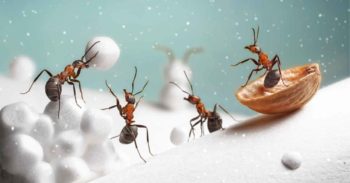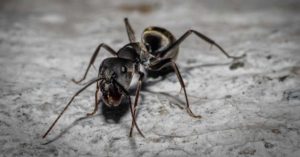
 Ants are regularly labeled the most intelligent of all insects. Time magazine even declared “Your Ant Farm Is Smarter Than Google.” Yet some look down on ant intelligence, arguing that – due to the size of their brains – ants are not actually smart but just follow signals. The reality is more complex and fascinating.
Ants are regularly labeled the most intelligent of all insects. Time magazine even declared “Your Ant Farm Is Smarter Than Google.” Yet some look down on ant intelligence, arguing that – due to the size of their brains – ants are not actually smart but just follow signals. The reality is more complex and fascinating.
What is Intelligence?
One of the first challenges in measuring the intelligence of any species is determining – What is intelligence? Often people are biased in favor of animals whose intelligence has similarities to our own. The definition used makes a difference… Is it learning and mimicking behavior? Is it reasoning and problem solving? Is it something we, as humans, might underestimate because of how we think?
Jill Richardson, a dolphin researcher at the University of Miami’s Rosenstiel School for Marine and Atmospheric Science, keeps the latter point in mind while studying dolphin intelligence. She says that studying animal intelligence showed her that we might not be as smart as we think we are, and that understanding intelligence might be a broader and more colorful experience than we commonly think.
Do Ants Have Brains?
Yes, ants have brains – albeit very small ones. An ant’s brain has 250,000 neurons. Human brains, by comparison, have more than 100 billion brain cells.
Despite the relative smallness of an ant’s brain in comparison to humans, scientists consider the ant to have the largest brain of all insects. Regardless of how ant brains are rated, they can communicate, avoid and fight enemies, search for food, show courtship signals, and use complex navigation over long distances.
Are Ants the Smartest Insect?
Ants are considered one of the smartest insects. Bees are generally ranked smarter, though, and have shown the ability to observe, learn, and demonstrate the memory needed to problem solve. Their ability to navigate a wildly divergent field of flowers helps to illustrate this.
Still, even though bees may be smarter, ants are among the top most intelligent insects. One study showed that ants possess the ability to use tools – which is a common way to assess intelligence.
Ants were presented with liquids (including both diluted and pure honey) as well as a variety of items such as those they would find in the wild including grains of soil, pine needles, and twigs. Artificial items like sponge and paper were also available.
The observed ants used the grains of soil to soak up the diluted honey and then used the sponge to absorb and transport the pure honey… even tearing the sponge into smaller pieces that the ants could more easily carry. That indicated a reasoning ability. A second group of ants tested each option before exclusively using paper and sponge, which indicated learning ability.
What Is a Hive Mind?
Hive mind theory is about collective understanding as opposed to individual. The term comes from bees and is commonly applied to other highly social insects like ants. It is often interpreted by the general public and depicted in science fiction as an individual creature not having any intelligence without the group and instead having linked minds. That is not really what it means or how insects actually function.
Instead, a hive mind is about how knowledge is collectively sourced instead of learned individually. Humans can have aspects of hive mind experiences, such as when a group is experiencing the same thing and act as one. Humans are influenced by those they admire and can duplicate their behavior due to the influence. So, while we do not have a true hive mind, aspects of it do exist through collective thinking.
Learning from other people’s experiences to save time instead of “recreating the wheel” is smart. Just doing things because others do them can be more problematic.
What Is Collective Intelligence?
Collective intelligence is knowledge sourced from a group. It is when people work together to create knowledge that could not be attained individually.
The Massachusetts Institute of Technology created the MIT Center for Collective Intelligence, which examines “how people and computers can be connected so that – collectively – they act more intelligently than any person, group, or computer has ever done before.”
Arrow Exterminates Ants
Don’t let ants drive you buggy. If you think you have an ant problem, keep your family safe and prevent it from getting worse by calling Arrow Exterminating to identify the type of ant and eliminate them. To get started, contact Arrow Exterminating today.




